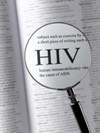Overview

NICHD initiated these partnerships in 1999 to strengthen social and behavioral sciences research on HIV/AIDS in developing countries. Although the biological mechanisms underlying HIV/AIDS transmission are well-characterized, HIV prevalence and incidence continue to increase, demonstrating the need for improved understanding of the social and behavioral factors that contribute to HIV transmission. Research in HIV hot spots is essential for guiding the development of feasible and sustainable interventions that can be implemented locally.
Grants funded by the NICHD Population Dynamics Branch (PDB), in partnership with the National Institute of Mental Health and the National Institute on Aging , support partnerships between organizations in developing and developed countries. The partnerships enhance social and behavioral sciences research on HIV/AIDS by encouraging the development and growth of research infrastructure at institutions in developing countries and by directly supporting research on HIV/AIDS.
Local social and behavioral scientists lead the research in developing countries in conjunction with scientists from developed countries. The scope of the initiative includes research on HIV/AIDS related to anthropology, demography, economics, psychology, sociology, and social work.
Topic Areas
Research areas of interest include (1) social and behavioral research related to HIV/AIDS prevention, care, and treatment in local environments; (2) development of research infrastructure and research capacity; and (3) establishment or enhancement of partnerships among local investigators, public health officials, institutions, and health care providers.
Selected research topics include, but are not limited to:
- Evaluation of individual, cultural, social, economic, and institutional influences on HIV-related risk behavior to inform intervention strategies
- Identification and testing of innovative intervention approaches at the individual, group, and community levels
- Assessment of the effects of gender on HIV prevention, treatment, and care
- Examination of the role and impact of religious organizations, traditional health practitioners, and traditional health practices on prevention, care, stigma, and treatment
- Analysis of the interrelationships between HIV/AIDS prevention, treatment, and care, and other aspects of reproductive health and family planning, including other sexually transmitted diseases, desire for children, and use of contraception
- Evaluation of HIV/AIDS prevention, treatment, and care among children infected with HIV or orphaned by AIDS, or in families affected by the epidemic
- Assessment of interventions to mitigate the adverse social, psychological, financial, and health consequences of being a parent or relative of someone who dies from AIDS
- Analysis of the impact of the AIDS epidemic on educational, social security, pension, health, and welfare systems
Current Partnerships
- Brown University in partnership with the University of Cape Town, South Africa
- Columbia University Health Sciences in partnership with Hanoi Medical University in Vietnam
- University of South Florida in Partnership with University of Haiti
More Information
NICHD Contact: Rebecca Clark
 BACK TO TOP
BACK TO TOP